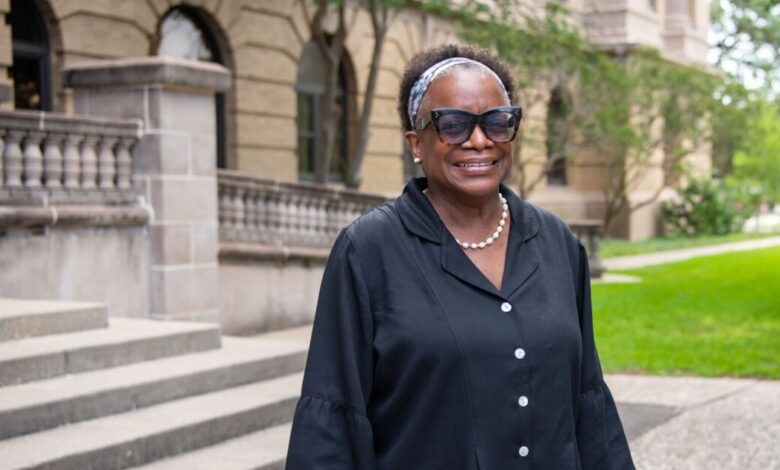After a Botched Hiring at Texas A&M, a Prominent Journalist Has Chosen to Stay Where She Is

Texas A&M University at College Station has attracted national headlines after contract negotiations broke down with an alumna it was trying to hire to revive its journalism school. Now the alumna won’t be coming to campus after all, and a senior administrator involved in her hiring has stepped down days after advising the journalist not to take the job.
The university’s deal with Kathleen O. McElroy, a prominent Black journalist, former New York Times editor and director of the University of Texas at Austin’s journalism program, fell apart as her tenure status and the term of her contract were thrown into doubt. That complication developed after conservative critics expressed reservations about her work on diversity, equity, and inclusion efforts, pointing to her advocacy for newsroom diversity and previous statements she’s made about objectivity in journalism. Though conversations about McElroy’s contract with Texas A&M were ongoing as of late last week, The Chronicle has learned McElroy will remain in her role as a tenured professor at UT-Austin this fall. The director of UT-Austin’s School of Journalism and Media, David M. Ryfe, told The Chronicle he’d confirmed on Tuesday with UT-Austin administrators that McElroy would stay at his institution.
Last week, the interim dean of Texas A&M’s College of Arts and Sciences, José Luis Bermúdez, warned McElroy that he wouldn’t be able to protect her from “DEI hysteria” that arose from her hiring and advised her to stay in her tenured role at UT-Austin, The Texas Tribune reported. Now, Bermúdez has resigned from his administrative position, writing in an email to the college on Monday that his “continuation in this role would be a needless distraction.” (Bermúdez shared the message with The Chronicle but said he had no further comment. McElroy and Texas A&M did not respond to requests for comment on Tuesday.)
In a statement to The Chronicle last week, McElroy said the situation “deserves examination on many fronts” and that there is “much more I could say and will say,” adding that she was “deeply grateful” for the support she’d received.
That McElroy’s hire — which the university celebrated last month with a signing ceremony and balloons, as the Tribune reported — went awry before it went to the board for formal approval exemplifies the growing target conservative lawmakers and advocates have placed on DEI work and the people who do it. McElroy’s case bears striking similarities to that of Nikole Hannah-Jones, another prominent New York Times writer who was slated to lead a journalism program at her alma mater before conservative complaints derailed contract negotiations. Both McElroy and Hannah-Jones are Black women who have advocated for diversity in media, with Hannah-Jones’s work on the Times’ 1619 Project having attracted criticism. The McElroy situation is unfolding weeks after a law banning DEI offices and programming in Texas, as well as mandatory DEI training and the use of diversity statements in hiring, took effect on July 1.
The Foundation for Individual Rights and Expression on Tuesday wrote a letter to Texas A&M saying that “revoking McElroy’s original employment offer in response to powerful political forces, big donors, or alumni groups that object to her views effectuates unconstitutional viewpoint discrimination in violation of TAMU’s binding First Amendment obligations.”
A ‘Hornet’s Nest’
At Texas A&M, Bermúdez, the interim dean, told McElroy last week that her appointment had “stirred up a hornet’s nest” that could force the university to fire her, according to the Tribune. His warning, the Tribune reported, came a day after the Texas A&M University system Board of Regents discussed McElroy’s hiring with M. Katherine Banks, president of Texas A&M University at College Station. Bermúdez, who was appointed interim dean in May 2022, told the Tribune he would remain a professor of philosophy at the university and that he did not know who would replace him as dean.
The deal with McElroy had shown signs of strain before Bermúdez advised her to stay away. Initially, she agreed to join Texas A&M as a tenured professor, without any end date on her appointment. After concerns surfaced, she agreed to a five-year deal without tenure. But Texas A&M’s final offer was for a one-year contract as a professor without tenure and a separate three-year administrative contract to direct the journalism program, according to the Tribune.
Last Thursday, a lawyer representing McElroy told The Chronicle that his client “just couldn’t accept” the one-year professorship. The lawyer, David T. Lopez, said that the terms of McElroy’s contract had been watered down following the meeting of the system’s board and an earlier article on the conservative news site Texas Scorecard that was critical of McElroy’s hiring.
He added that McElroy still hoped to work out employment terms with Texas A&M and that he would meet with the university system’s general counsel on Friday to understand “the nature of concerns and complaints” about the professor. (The general counsel’s office did not respond to an inquiry about the meeting; Lopez told The Chronicle early Saturday that discussions between the university and McElroy were ongoing. But on Monday, Lopez told The Chronicle that he no longer represented McElroy.)
Also at issue for conservative critics, including the Rudder Association, a group of alumni and other community members established in 2020 to “preserve, defend, and perpetuate the core values and unique culture of Texas A&M University,” was a 2021 interview McElroy gave to WBUR about journalism’s role in the country’s racial reckoning. “We can’t just give people a set of facts anymore,” McElroy said. “I think we know that, and we have to tell our students that. This is not about getting two sides of a story or three sides of a story, if one side is illegitimate. I think now you cannot cover education, you cannot cover criminal justice, you can’t cover all of these institutions without recognizing how all these institutions were built.”
The Rudder Association’s president, Matthew Poling, told The Chronicle his organization registered concerns about McElroy’s “expressed ideology and her lack of an expressed plan to address the current mistrust of the profession” in an email to the university last week. But in a press release, the organization disputed media reports that characterized the association as a powerful alumni group that held significant sway in the university’s decision to reconsider its initial offer to McElroy.
McElroy’s appointment was meant to bring new life to Texas A&M’s long-defunct journalism program. The university had a journalism department and degree program until 2004, when it was discontinued after 55 years.
Source link






